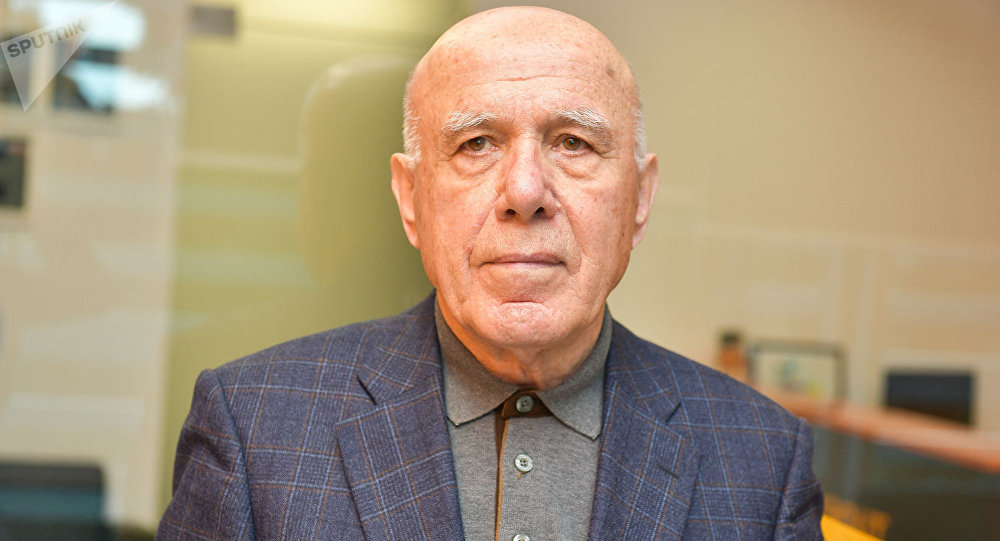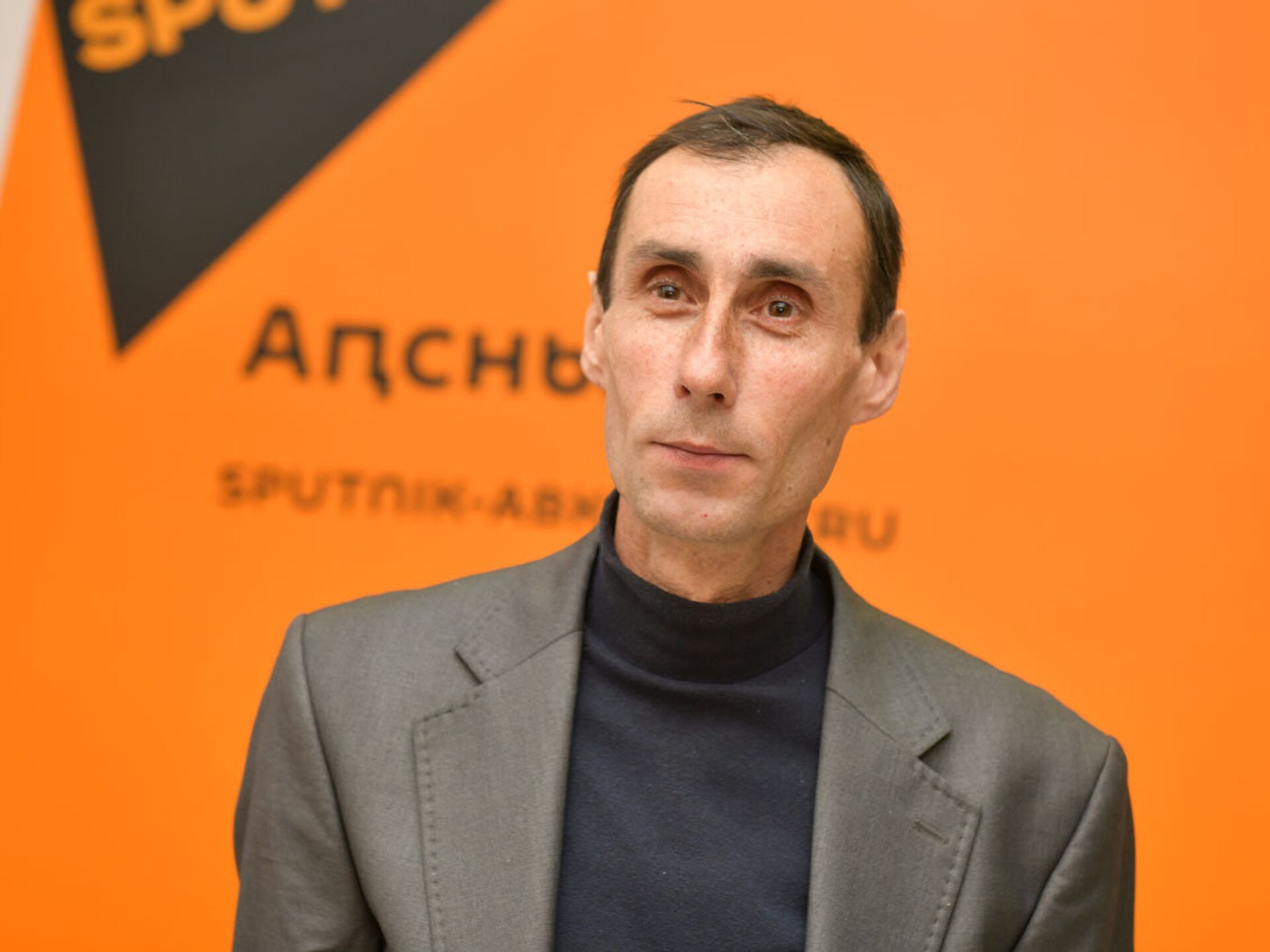The 30th Anniversary of Abkhazia's Victory Explored at a Sputnik Round Table

Aslan Avidzba (left), Oleg Damenia and Photo journalist Thomas Taytsuk.
SUKHUM / AQW'A — The Center for Socio-Economic Studies, in collaboration with the International News Agency Sputnik, organised a round table titled "On the 30th Anniversary of Abkhazia's Victory: Geopolitical Aspect." Participants gathered at the Sputnik press centre to explore the causes and consequences of the war and discuss the challenges and opportunities facing the republic in the post-war era.
The War that United the People
Oleg Damenia, a Candidate of Philosophical Sciences and the Director of the Center for Socio-Economic Studies, conveyed the profound significance of the upcoming anniversary of the Victory, describing it as a sacred celebration for the inhabitants of Abkhazia.

Oleg Damenia, The director of the Centre for Social and Economic Research
“In our society, the memory of those who perished in this war endures; their images are enshrined on the altar of the Motherland, and this is something we hold in high regard. This is not only the emotional and ritualistic aspect of Victory but also a reflection of its substantive value; it was not handed to us freely. Substantial resources, including internal social ones, were expended for the Victory,” he emphasised.
Damenia pointed out that the ability of Abkhazia to overcome the superior forces of the adversary and secure victory remains a subject of intrigue for many analysts. “Our people were understandably anxious, but there was no widespread panic. While there were individuals who fled and those who doubted our resilience, they did not shape the overall sentiment of society. The predominant discourse within society focused on strategies for repelling aggression, organising defences, and transitioning to a war footing,” the expert elaborated.
Society, united by a common purpose, was able to autonomously transition to a war footing. The entire population contributed to the war effort, supplying fighters with essential provisions and attire. A sense of collective responsibility and determination permeated the nation, bolstering the militia's readiness for battle.
Securing Resources and Unity Amidst Conflict
Addressing the mobilisation efforts during the war, the director of the Center for Socio-Economic Studies highlighted the unity and mutual vigilance between the authorities and the people. “We were tasked with securing weapons and ammunition; some focused on these aspects, while others addressed food and clothing needs. There was a reciprocal watchfulness – the authorities were attentive to the people’s actions, and the people were observant of the authorities’ initiatives. They were tightly interlinked, and I discerned no discord between them. Vladislav Ardzinba might have rebuked his colleagues, but he never chastised the people; he lauded the populace’s endeavours. The citizens weren’t contemplating escape; their thoughts were anchored on defending their Homeland, their Fatherland,” he stressed.
Damenia underscored the absence of internal dissent, attributing the societal cohesion to the war which fortified the society and enabled an effective resistance against Georgian aggression. “Securing victory was the paramount objective for the people in those circumstances. Once achieved, this objective lost its centrality; it ceased to be the unifying force, leading to a relaxation of societal vigilance and a subsequent plunge into a crisis of social uncertainty, a situation that persists,” he observed. Damenia lamented the lack of a contemporary strategic goal capable of consolidating society and sustaining its vitality.

Dr. Aslan Avidzba, a Doctor of Historical Sciences.
Root Causes of the Conflict
Turning to the causes of the conflict, Dr. Aslan Avidzba, a Doctor of Historical Sciences, pointed to the significant role of the geopolitical aspect. "We inhabit a geopolitical fault line, where this factor is perpetually influential. The geopolitical challenges that acted as catalysts and ignited the processes culminating in war are still present; in fact, their potential for realisation is arguably greater now," he remarked.
Avidzba stressed the importance of learning from history, not just being aware of it, noting that the war in Abkhazia unfolded merely eight months after the Soviet Union’s dissolution. “The principal catalyst was the disintegration of the Soviet state, and it is universally acknowledged who stood to gain from it. It marked the continuation of the USSR’s downfall, with Russia narrowly avoiding a similar fate, being perceived in the West as an emergent ally. The forces intent on reconfiguring the global landscape to their advantage persist in their endeavours,” the historian concluded.
A Fateful War and the Necessity of Cohesion
The conflict in Abkhazia, while labelled a local skirmish internationally, held fateful consequences for the Abkhazian populace. Aslan Avidzba contends that the republic must acknowledge that Abkhazia’s paramount interests might not bear decisive significance for other nations. “Our entire history, including the post-war period, indicates that the understanding and protection of our interests lie squarely on our shoulders; external entities won’t champion our cause. Oleg Damenia highlighted the intrinsic factor instrumental to our war-time Victory – the internal cohesion, predominantly of the Abkhazian community. Absent this unity within Abkhazian society, should we fail to cultivate such solidarity amongst the Abkhazian people, the safeguarding of Abkhazia’s national interests remains unattainable,” Avidzba asserted.
Discussing the parallels between the situations in Karabakh and Abkhazia, the historian accentuated that Abkhazian society cannot afford apathy towards its present circumstances. “Our current reality is founded upon a past that witnessed the sacrifice of our brethren, paving the way for the present we commemorate today. The scenario in Karabakh, where a state, extant for three decades and ostensibly under the guardianship of a protectorate, vanished from the geopolitical map overnight, underscores the gravity of geopolitical dynamics,” Avidzba remarked.
Avidzba concluded by emphasising that the preservation of Abkhazian identity is viable solely within its territorial bounds; any attempt at conservation beyond this geographical domain is futile. He warned that the disputes among the major geopolitical contenders could have profound implications for Abkhazia’s future.